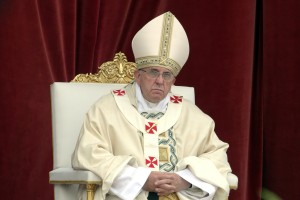 Writing in the New York Times, Clay Routledge notes the interesting, if unsurprising, fact, that someone’s religious instinct doesn’t disappear simply because he or she has rejected ‘established’ religion:
Writing in the New York Times, Clay Routledge notes the interesting, if unsurprising, fact, that someone’s religious instinct doesn’t disappear simply because he or she has rejected ‘established’ religion:
Just a couple of decades ago, about 95 percent of Americans reported belonging to a religious group. This number is now around 75 percent. And far fewer are actively religious: The percentage of regular churchgoers may be as low as 15 to 20 percent. As for religious belief, the Pew Research Center found that from 2007 to 2014 the percentage of Americans who reported being absolutely confident God exists dropped from 71 percent to 63 percent.
Nonetheless, there is reason to doubt the death of religion, or at least the death of what you might call the “religious mind” — our concern with existential questions and our search for meaning. A growing body of research suggests that the evidence for a decline in traditional religious belief, identity and practice does not reflect a decline in this underlying spiritual inclination.
Ask yourself: Why are people religious to begin with?
Well, there was that Minnesota study of twins reared apart described in this Wall Street Journal article a few years back (I posted about it here):
The Minnesota study’s IQ results hit a nerve years before their publication in 1990, overshadowing other controversies that might have been. Many of its findings are bipartisan shockers. Take religion, which almost everyone attributes to “socialization.” Separated-twin data show that religiosity has a strong genetic component, especially in the long run: “Parents had less influence than they thought over their children’s religious activities and interests as they approached adolescence and adulthood.” The key caveat: While genes have a big effect on how religious you are, upbringing has a big effect on the brand of religion you accept. Identical separated sisters Debbie and Sharon “both liked the rituals and formality of religious services and holidays,” even though Debbie was a Jew and Sharon was a Christian.
I eagerly looking forward to what Routledge had to say about the “religious mind” as something that is inherited, an aspect of the ‘God Gene’, yet another by-product of the evolutionary process.
But no, to Mr. Routledge, the “fundamental nature” of the religious mind is:
[O]ur awareness of, and need to reckon with, the transience and fragility of our existence, and how small and unimportant we seem to be in the grand scheme of things. In short: our quest for significance.
Count me out of that “quest”, but each to his own…
But then Routledge moves into more interesting territory:
Evidence suggests that the religious mind persists even when we lose faith in traditional religious beliefs and institutions. Consider that roughly 30 percent of Americans report they have felt in contact with someone who has died. Nearly 20 percent believe they have been in the presence of a ghost. About one-third of Americans believe that ghosts exist and can interact with and harm humans; around two-thirds hold supernatural or paranormal beliefs of some kind, including beliefs in reincarnation, spiritual energy and psychic powers.
These numbers are much higher than they were in previous decades, when more people reported being highly religious. People who do not frequently attend church are twice as likely to believe in ghosts as those who are regular churchgoers. The less religious people are, the more likely they are to endorse empirically unsupported ideas about U.F.O.s, intelligent aliens monitoring the lives of humans and related conspiracies about a government cover-up of these phenomena.
An emerging body of research supports the thesis that these interests in nontraditional supernatural and paranormal phenomena are driven by the same cognitive processes and motives that inspire religion. For instance, my colleagues and I recently published a series of studies in the journal Motivation and Emotion demonstrating that the link between low religiosity and belief in advanced alien visitors is at least partly explained by the pursuit of meaning. The less religious participants were, we found, the less they perceived their lives as meaningful. This lack of meaning was associated with a desire to find meaning, which in turn was associated with belief in U.F.O.s and alien visitors.
When people are searching for meaning, their minds seem to gravitate toward thoughts of things like aliens that do not fall within our current scientific inventory of the world. Why? I suspect part of the answer is that such ideas imply that humans are not alone in the universe, that we might be part of a larger cosmic drama. As with traditional religious beliefs, many of these paranormal beliefs involve powerful beings watching over humans and the hope that they will rescue us from death and extinction.
A great many atheists and agnostics, of course, do not think U.F.O.s exist. I’m not suggesting that if you reject traditional religious belief, you will necessarily find yourself believing in alien visitors. But because beliefs about U.F.O.s and aliens do not explicitly invoke the supernatural and are couched in scientific and technological jargon, they may be more palatable to those who reject the metaphysics of more traditional religious systems.
It is important to note that thus far, research indicates only that the need for meaning inspires these types of paranormal beliefs, not that such beliefs actually do a good job of providing meaning. There are reasons to suspect they are poor substitutes for religion: They are not part of a well-established social and institutional support system and they lack a deeper and historically rich philosophy of meaning. Seeking meaning does not always equal finding meaning.
Or at least an acceptable facsimile of meaning for the individual in question. ‘Meaning’ in this sense can only ever be subjective.
Routledge:
The Western world is, in theory, becoming increasingly secular — but the religious mind remains active. The question now is, how can society satisfactorily meet people’s religious and spiritual needs?
Well, it’s not up to ‘society’ to decide on this one way or another, but, if Routledge is correct (which, I think he is, if not quite for the right reasons) , the religious impulse is not going anywhere soon. That suggests that much of atheist rage—itself an expression, I suspect, of religious feeling—against organized religion is misdirected.
Organized religion can be a device for channeling the innate religious impulse in a positive manner. It can be, but very often is not. Those who either lack or have little in the way of a religious mind should oppose the more destructive forms of organized religion (there are plenty of examples to choose from) while welcoming the existence of those that are relatively benign.
As I’ve noted here before, the more or less agnostic Winston Churchill said that he was not a pillar of the Church of England, but a buttress, ”supporting it from the outside”. I feel much the same way.
To repeat myself from that earlier post:
At its best, the C of E…is in some ways as close to perfection as religion—a man-made thing—can come to perfection, benign, kindly, gently patriotic, theologically broad-minded, a quiet conservator of tradition and order with room (for those who want it) for a spot of the supernatural, but little time for superstition, the navel-gazing nonsense of mysticism or an over-insistence on dogma.
Beats a UFO cult any day.

 The Jesuits’ America magazine is a somewhat overwrought publication, and
The Jesuits’ America magazine is a somewhat overwrought publication, and Cross-posted
Cross-posted  The Des Moines Register
The Des Moines Register 

 An extract (
An extract ( MIT Technology Review:
MIT Technology Review: Writing
Writing  It is—time flies—now thirty years since the appearance of The Closing of the American Mind, an anniversary
It is—time flies—now thirty years since the appearance of The Closing of the American Mind, an anniversary  Well, here’s something for everyone: Pipelines, eminent domain, nuns, ‘religious liberty’ or (take your pick) religious privilege.
Well, here’s something for everyone: Pipelines, eminent domain, nuns, ‘religious liberty’ or (take your pick) religious privilege.